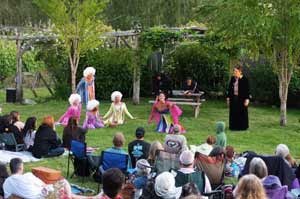By Scott Rasmussen
It would only be natural to ask the question, “Why?”.
But if you are wondering about the inspiration for giving William Shakespeare’s classic comedy about lovers and dreamers a spin against the backdrop of the free-wheeling, mind-bending days of the late 1960s, the better question might be, “Why not?”.
“Actually, it makes a lot of sense,” said Texas native Ileana Herrin, who stars in Island Stage Left’s summer production of “A Midsummer Night’s Dream, in the role of Puck. “The play is a lot about dreams and whether they’re reality or not, and figuring out what are true feelings and what aren’t. It’s really about believing in your dreams.”
With a cast of nearly two dozen, Stage Left makes its way back to San Juan Island, after opening the show with four performances last week on Orcas, Shaw and Lopez, to begin a six-week run of one of the Bard’s most endearing and whimsical comedies, Thursday, on the outdoor stage of Roche Harbor Resort.
Call it Shakespeare’s “Summer of Love” under the stars. The curtain rises at 8:30 p.m., with performances on Friday, Saturday and Sunday of this week as well.
Herrin, a graduate of the University of Texas, Austin, in theater and dance, has played the role of Puck before. But her character was designed to be more classic in nature — more like Peter Pan than clown-and-slapstick — five years ago when she tackled that role. The 28-year-old, the first profession al actor in the family, said it has been easy to slip into character and to adopt a different approach while surrounded by so much natural beauty.
“Living in a cabin out in the woods on a beautiful island, I feel like I’m in a dream state right now,” she said. “I think bringing nature into the performance is just beautiful.” Like most Shakespeare comedies, the bonds of marriage are integral to “A Midsummer Night’s Dream”. But of equal importance to the plot are dreams, magic, illusion, fairies, Mother Nature, mistaken identities and love; not necessarily in that order.
Hermia loves Lysander, Lysander loves Hermia, Helena loves Demetrius, but Demetrius loves Hermia, or so he believes. The fun begins when Lysander and Hermia run away from home, intending to elope, to avoid Hermia’s betrothal to Demetrius. Helena and Demetrius follow and the four end up in a forest where a troupe of buffoonish actors are rehearsing a play, and a band of mischievous fairies, led King Oberon and his second-in-command, Puck, weave a series of powerful, and sometimes misdirected, magic spells.
Herrin believes that Shakespeare saw much of himself in Puck, and by giving the character the power to mess everything up and then to set it right.
“It’s interesting in that he creates all the drama and then fixes it in the end,” she said. “He’s like the Sandman almost, leading people through this dream state that doesn’t seem to make any sense until the end.”
As the character Bottom, Stage Left mainstay Daniel Mayes has perhaps the play’s most comedic role. Herrin says that Mayes possesses the skills to raise the level of performance of all those around him, herself included.
“He’s fantastic,” she said. “My favorite thing as an actor is playing with other actors who are ridiculously talented because you learn from them.”
That’s something to believe in.




